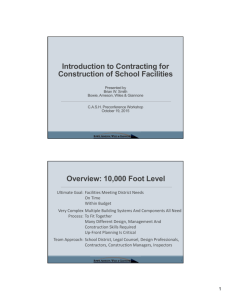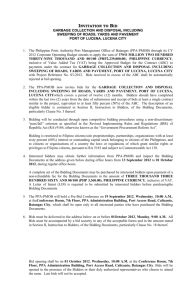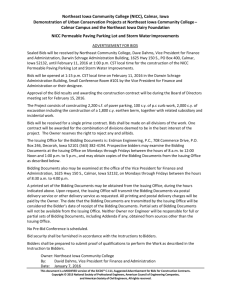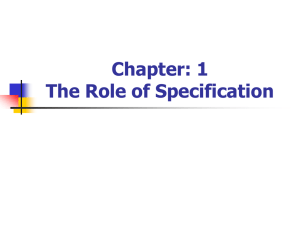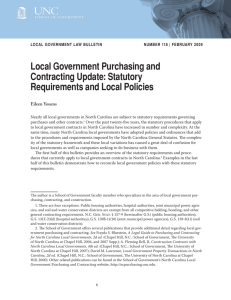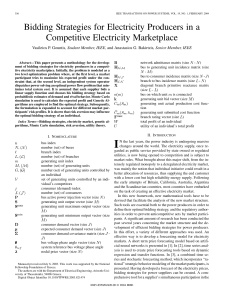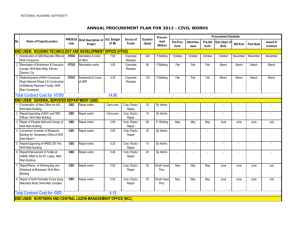European Federation of Foundation Contractors The Use of
advertisement
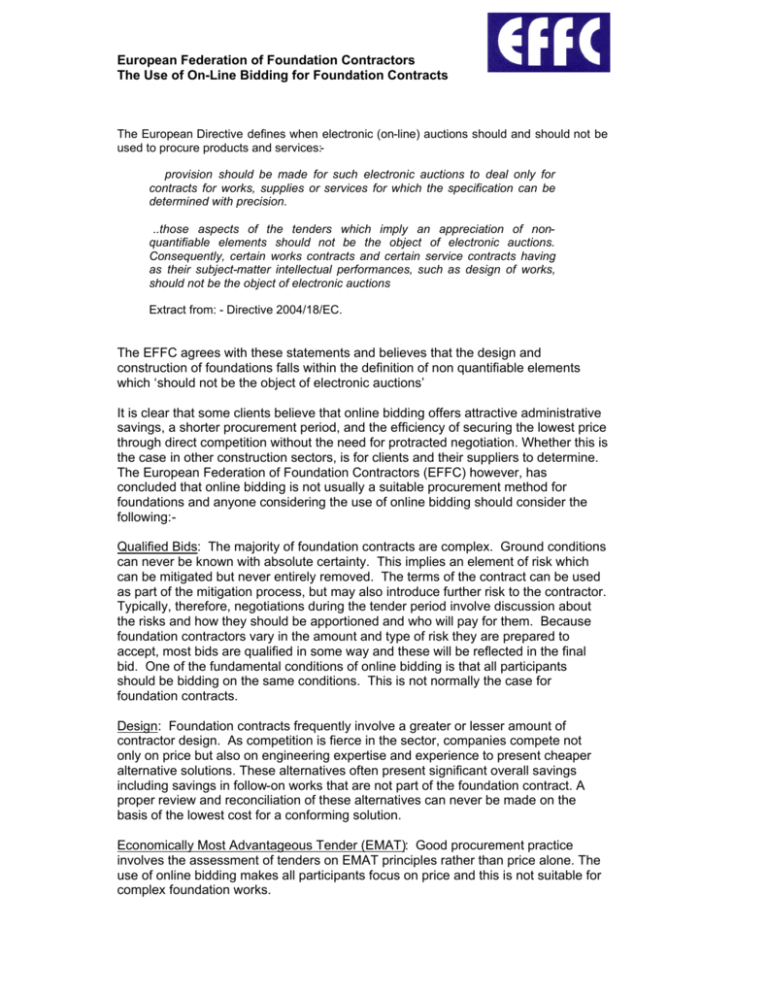
European Federation of Foundation Contractors The Use of On-Line Bidding for Foundation Contracts The European Directive defines when electronic (on-line) auctions should and should not be used to procure products and services:“… provision should be made for such electronic auctions to deal only for contracts for works, supplies or services for which the specification can be determined with precision.” “..those aspects of the tenders which imply an appreciation of nonquantifiable elements should not be the object of electronic auctions. Consequently, certain works contracts and certain service contracts having as their subject-matter intellectual performances, such as design of works, should not be the object of electronic auctions” Extract from: - Directive 2004/18/EC. The EFFC agrees with these statements and believes that the design and construction of foundations falls within the definition of non quantifiable elements which ‘ should not be the object of electronic auctions’ It is clear that some clients believe that online bidding offers attractive administrative savings, a shorter procurement period, and the efficiency of securing the lowest price through direct competition without the need for protracted negotiation. Whether this is the case in other construction sectors, is for clients and their suppliers to determine. The European Federation of Foundation Contractors (EFFC) however, has concluded that online bidding is not usually a suitable procurement method for foundations and anyone considering the use of online bidding should consider the following:Qualified Bids: The majority of foundation contracts are complex. Ground conditions can never be known with absolute certainty. This implies an element of risk which can be mitigated but never entirely removed. The terms of the contract can be used as part of the mitigation process, but may also introduce further risk to the contractor. Typically, therefore, negotiations during the tender period involve discussion about the risks and how they should be apportioned and who will pay for them. Because foundation contractors vary in the amount and type of risk they are prepared to accept, most bids are qualified in some way and these will be reflected in the final bid. One of the fundamental conditions of online bidding is that all participants should be bidding on the same conditions. This is not normally the case for foundation contracts. Design: Foundation contracts frequently involve a greater or lesser amount of contractor design. As competition is fierce in the sector, companies compete not only on price but also on engineering expertise and experience to present cheaper alternative solutions. These alternatives often present significant overall savings including savings in follow-on works that are not part of the foundation contract. A proper review and reconciliation of these alternatives can never be made on the basis of the lowest cost for a conforming solution. Economically Most Advantageous Tender (EMAT): Good procurement practice involves the assessment of tenders on EMAT principles rather than price alone. The use of online bidding makes all participants focus on price and this is not suitable for complex foundation works. EFFC Position Paper: E-Procurement Bid Price and Claims: Although on first consideration obtaining the lowest possible price might appear advantageous to the client, the contractor may try to regain his margin through claims and variations - resulting in cost overruns, disputes and possible delays - or by reducing quality and/or safety. Uneconomic and Unsustainable Margins: Users of online bidding in the UK have claimed that ‘ savings’in excess of 30% have been achieved using e-auctions. Foundation contractors typically achieve pre-tax results below 5%. Cutting these margins further is likely to drive companies into liquidation and will restrict investment in plant and machinery; reduce the money available for research and development; and restrict resources available for safety and training. Bidder Behaviour: Researchers in Germany have expressed concern that people participating in an online auction may exhibit gambling behaviour or errors of judgement which might result in an unrealistically low bid (leading to the problems identified above). Competence of Contractors: The competence of specialist foundation contractor is a particularly important issue. Once the foundations have been incorporated into the works, it will be difficult, if not impossible, and certainly expensive, to rectify faults. The consequences of foundation failure are likely to be catastrophic. It is therefore essential that clients have confidence in the foundation contractor who undertakes the work - and the most competent contractors may not allow their integrity to be compromised in an online bidding race with competitors. Client – Contractor Relationships: The use of online bidding reduces the opportunity for a collaborative approach to problem solving and value based decision making. Opportunities for genuine cost savings may be lost and the likelihood of disputes is increased. Transparency: Experience to date has suggested that this is a major concern to EFFC members for the following reasons:∑ ∑ ∑ If the contract will be awarded using EMAT principles, the bidder knows the weighting that will be applied to his own bid, but is not aware of the weighting that will be applied to the bid currently displayed as the lowest; clients are suspected of introducing 'ghost bidders' to drive down the price; the auction may be comparing bids that are in fact quite different because:o variations in contract terms may have been agreed with the Client o factors of safety are more subjective in Geotechnics than in structural elements and may vary between bidders o design solutions may not be comparable For all the above reasons, EFFC Members have expressed reluctance to participate in e-auctions. Clients should consider carefully a decision to invite bids by this method and in particular whether:∑ ∑ ∑ some otherwise suitable companies might refuse to participate in the bidding process they will be able to identify the most suitable contractor at the end of the bidding; this method of procurement will prevent the development of good long-term relationships that are advantageous to both parties and support the viability and technical development of the foundation industry. EFFC Position Paper: E-Procurement EFFC October 2005
